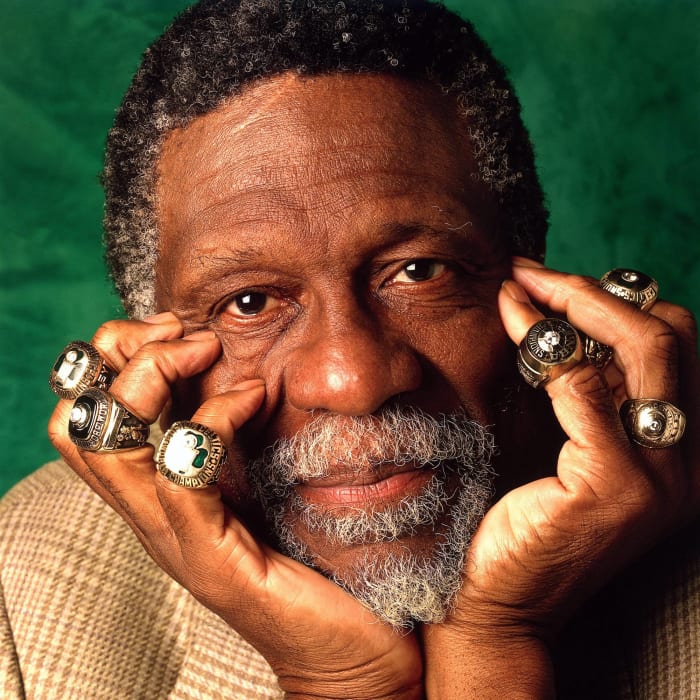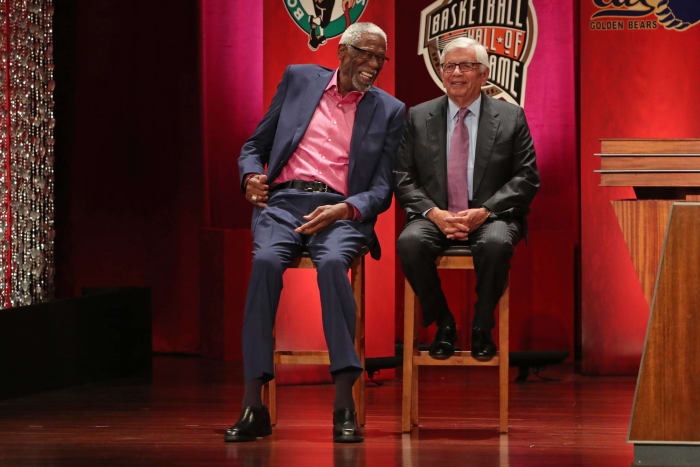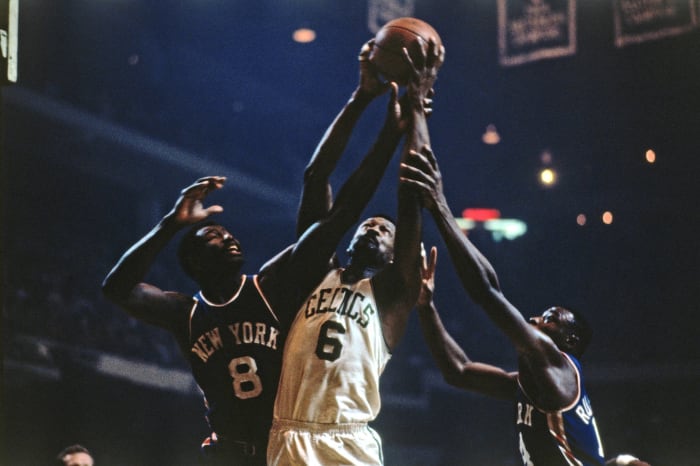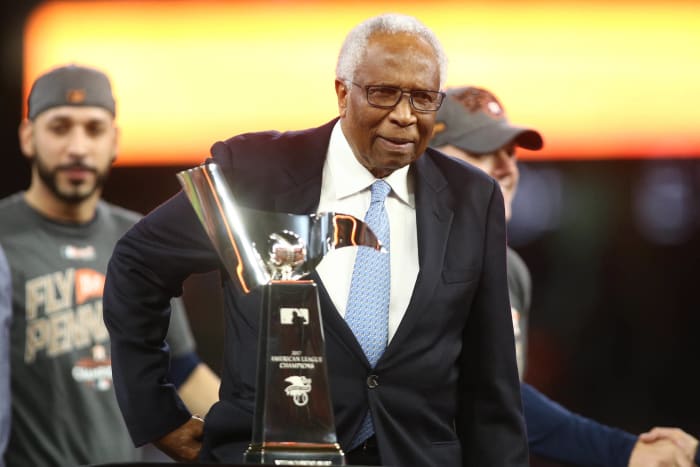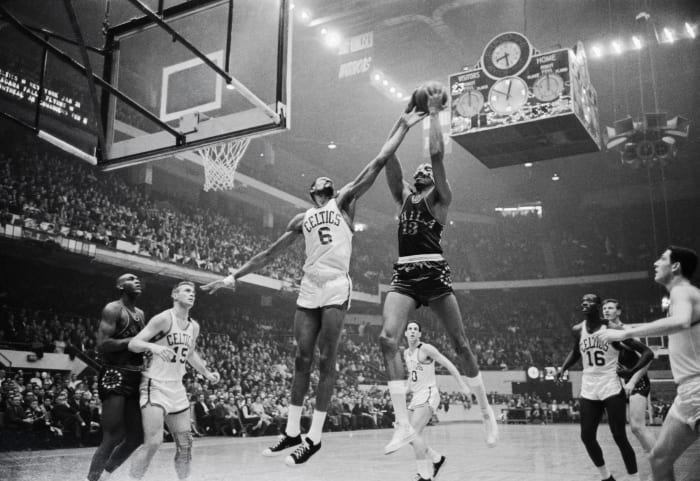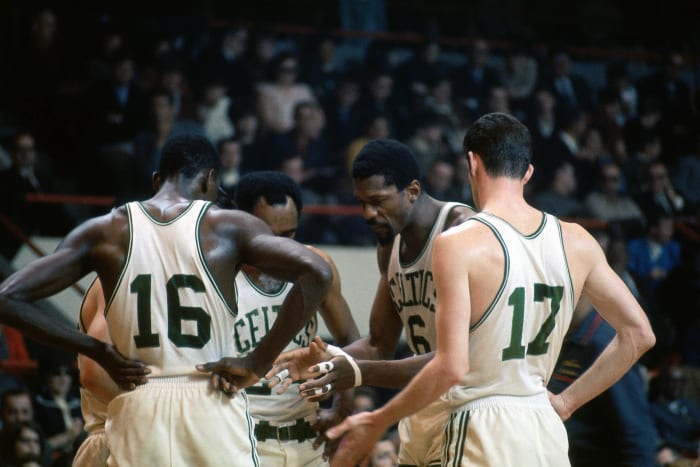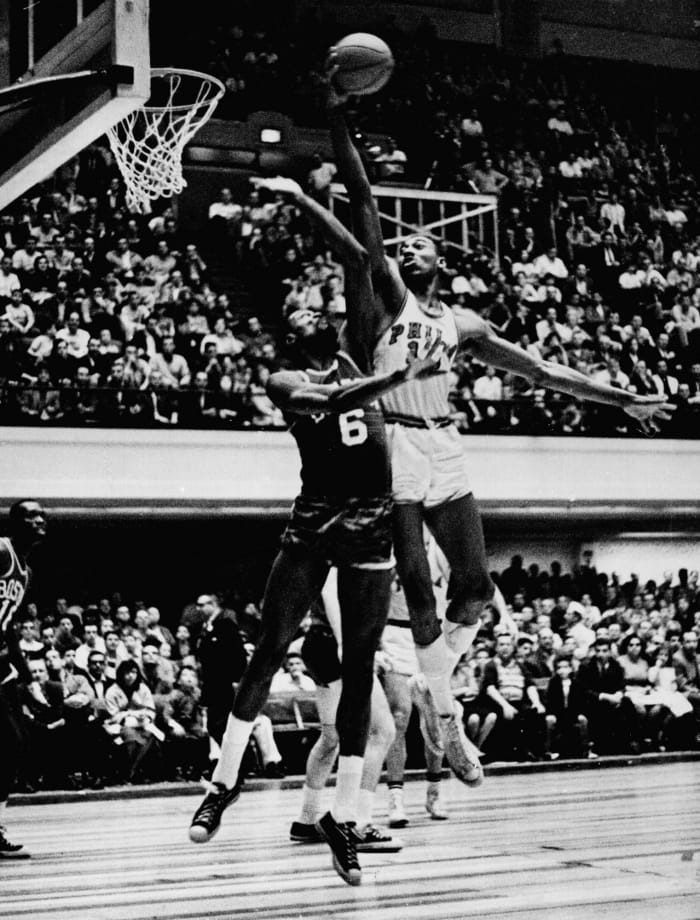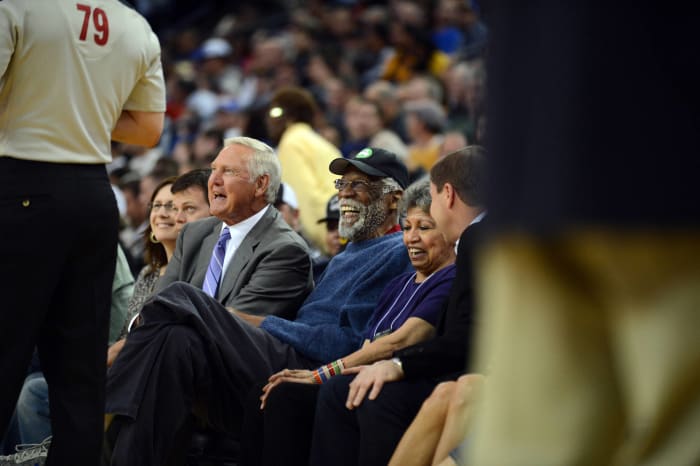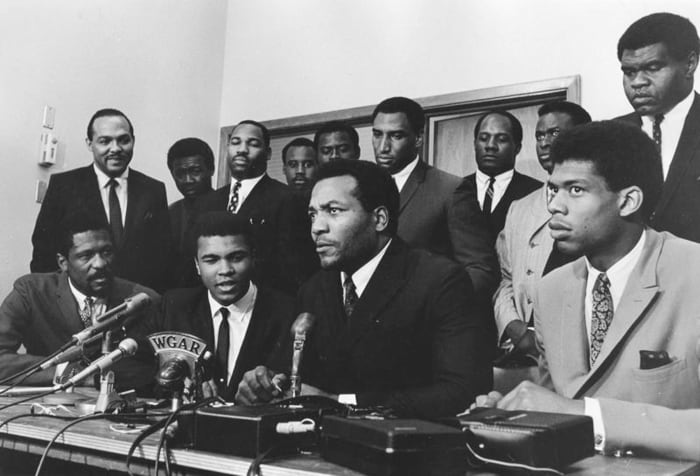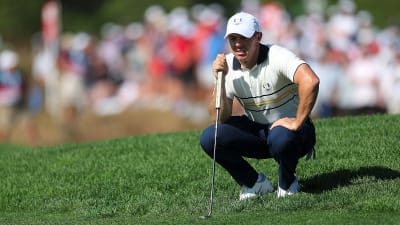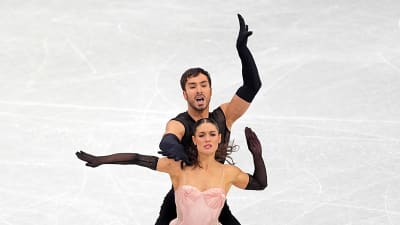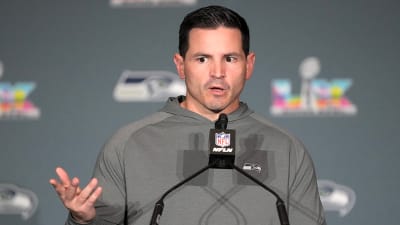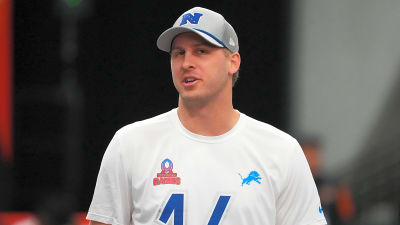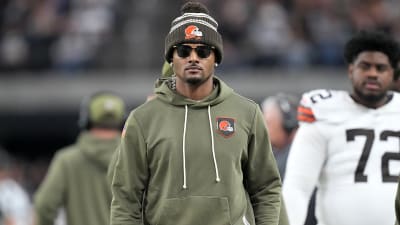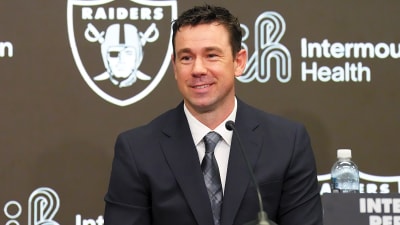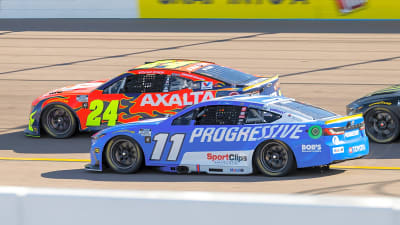Despite all of the accolades, records and famous anecdotes about him, most people still don't know much about Bill Russell — the player or the person. Part of that is due to a lack of game film from his era, but part of it is due to his somewhat introverted (albeit with good reason) personality and negative opinion toward the media. Whether you're looking to learn a little more about the NBA legend or simply want to reminisce on some of his trials, tribulations and accomplishments, here's a slideshow dedicated to the unbelievable winner and complex character who helped guide the NBA through its formidable years.
1 of 20
The ultimate winner
Nathaniel S. Butler/NBAE via Getty Images
"Bill Russell" is synonymous with "winning." The man won everything at every level of basketball. In high school he led his team to two state championships in California. At the University of San Francisco he tacked on two NCAA titles and a 55-game win streak. Next, he won an Olympic Gold Medal. He followed that up with 11 championships in 13 seasons in the NBA, including eight consecutive titles during one stretch in the 1960s. He even concluded his career by winning two championships in three seasons as a player-coach. No sport has ever seen a winner like Russell before, and no sport ever will see a winner like Russell again.
Nathaniel S. Butler/NBAE via Getty Images
Bill Russell accumulated a number of accolades during his Hall of Fame career. He made the All-NBA team 11 times, the All-Star team 12 times and won the Most Valuable Player award five times. He was also the first and only player-coach to win a title (he won two). However, perhaps the most impressive accolade of his career came in the 1961-62 season when he was voted Most Valuable Player after averaging a career-high 18.9 points and 23.6 rebounds per game. Why was this MVP so impressive? Because that was the same season that three other all-time NBA greats had their most impressive statistical seasons:
- Wilt Chamberlain averaged 50.4 points and 25.7 rebounds per game.
- Oscar Robertson averaged 30.8 points, 12.5 rebounds and 11.4 assists per game (first-ever triple-double).
- Elgin Baylor averaged 38.3 points and 18.6 rebounds per game.
Despite having inferior statistics, Russell was voted by his peers as the NBA's MVP that season — likely the most impressive MVP award in the history of the league.
3 of 20
Statistical achievements
D. Raphael/NBAE via Getty Images
For a player not known for his statistical achievements, Bill Russell still put up some insane numbers during his 13-year, 963-game regular-season career, averaging 15.1 points, 22.5 rebounds, 4.3 assists and a staggering 42.3 minutes per game. (Blocks and steals were not tracked.) He led the league in rebounding five times and minutes per game once. He ranks No. 1 in NBA history by a significant amount in defensive win shares (133.6, with Tim Duncan a distant second with 106.3), and is second in total rebounds, rebounds per game and minutes per game for his career.
Russell's career averages in the playoffs are even more impressive. In 165 career playoff games, he averaged 16.2 points, 24.9 rebounds, 4.7 assists and 45.4 minutes per game. In the 1962 playoffs, he averaged 48 minutes per game. The spring before, he averaged 29.9 rebounds per game. And much like the other players in the GOAT (Greatest of All Time) conversation, Russell played his best when the games mattered most, like Game 7, where he was a threat to do things like score 30 points and grab 44 rebounds in 53 minutes while holding the other team's centers to a combined 10 points and 14 rebounds like he did in Game 7 of the 1962 finals against the Lakers.
4 of 20
High school teammate Frank Robinson
Troy Taormina-USA TODAY Sports
Before Frank Robinson's passing earlier this month, few knew that Robinson and Bill Russell were actually basketball teammates at McClymonds High School in Oakland, California. How crazy is it that the two of the greatest players in NBA and MLB history both attended the same high school at the same time and actually played a sport together? Taking that rhetorical question a step further, how crazy is it that those same two high school teammates would go on to become the first-ever African-American head coaches in their respective sports? Absolutely insane.
Richard Mackson-USA TODAY Sports
Bill Russell was born in 1934 in West Monroe, Louisiana. After struggling with the effects of living in a segregated area of the country, his family moved to Oakland, California when he was 8 years old. Russell's family lived in various projects in Oakland during a tough adolescent stage which saw him lose his mother at age 12.
Russell married his high school sweetheart, Rose Swisher, with whom he'd had three children. His daughter, Karen Russell, would go on to become an attorney and television personality. Russell married two more times in his post-playing days and has lived in the Seattle area for the past four or five decades. Russell's lack of trust toward the media has always left people wanting to know a little more about the all-time winningest basketball player.
Pete Souza/White House/Sipa Press
Racism was a common theme throughout Bill Russell's life. In his early years, his grandparents and parents were often the target of prejudicial acts in the heavily segregated Louisiana, where he lived until he was 8 years old. In college Russell and his black teammates were sometimes not permitted to stay in hotels for road games. Before joining the NBA, he was invited to play with the Harlem Globetrotters in an exhibition game, but the owner, Abe Saperstein, refused to speak to Russell because of the color of his skin. As a player in the NBA, Russell, like many other African-Americans, experienced racial hate that makes the hair on your skin stand up every time you read about it.
7 of 20
University of San Francisco
Rich Clarkson/NCAA Photos via Getty Images
Seen as raw, Bill Russell was lightly recruited out of high school but ended up at the University of San Francisco under head coach Phil Woolpert. Not only did Woolpert make NCAA history by being the first coach to start three African-American players — Russell, future Celtics teammate K.C. Jones and Hal Perry — but he also helped Russell become a superstar by emphasizing defense and fundamental play on offense. Russell returned the favor by leading San Francisco to back-to-back NCAA titles in 1955 and 1956. Russell averaged 20.7 points and 20.3 rebounds per game for his college career.
Jack O'Connell/The Boston Globe via Getty Images
With few exceptions (LeBron James), most all-time NBA greats were associated with a legendary head coach. For Bill Russell, that coach was Red Auerbach. During a time when big men dominated basketball on the offensive side of the court, Auerbach saw Russell as the perfect centerpiece to his defense — a player who could protect the basket and initiate his fast break offense for Bob Cousy. Auerbach traded up in the 1956 draft to pick Russell No. 2 overall and saw immediate dividends, as Russell put up a casual 14 points and nearly 25 rebounds per game in the playoffs on the way to a championship his rookie season. After losing in the finals the following season because Russell got hurt and missed half the series, the coach and player won eight consecutive titles together and then two more when Auerbach became a full-time general manager, and Russell made the transition to player-coach. Auerbach was a visionary as a coach but also the perfect man to coach Russell, as he was, for lack of a better phrase, "color blind" during an era when most franchises had unwritten rules aimed at keeping the NBA from becoming "too black." Auerbach and Russell trusted and respected each other and were both driven by winning. They'll go down as the best coach-player combination in NBA history because of it.
Paul J. Maguire/The Boston Globe via Getty Images
During every season of his NBA career, Bill Russell played with no less than three, and as many as seven, other future Hall of Fame players on the Celtics. He joined a roster at the same time as Tommy Heinsohn with the likes of Bob Cousy, Bill Sharman and others already in place. Within a few seasons, his college teammate K.C. Jones and Sam Jones joined the franchise. The Cousy era ended about halfway through Russell's career and gave way to the John Havlicek era, which ran until the late 1970s. In all reality though, there wasn't really a Cousy or Havlicek era — there was the Russell era. Most of the Hall of Fame players who were fortunate enough to have played with Russell made the Hall of Fame because they played with Russell.
Bettmann / Contributor / Getty Images
Ironically, the greatest shot blocker in NBA history played before the league kept track of the statistic. It wasn't just that he protected the rim and blocked shots, Bill Russell mastered the ability to deflect the ball to himself or a teammate instead of swatting it out of bounds, thereby igniting the Celtics' famous fast break. In researching for "The Book of Basketball," Bill Simmons estimates that Russell blocked anywhere between eight and 15 shots per game in playoffs. For a comparison, the all-time leader in blocked shots in the playoffs (Tim Duncan) averaged a little over two blocks per game.
Bettmann / Getty Images
One of the coolest anecdotes for Russell's career is that he would be so tense before games that he would literally get sick in the locker room. Stories of Red Auerbach waiting for Bill Russell to vomit before sending his team out onto the court before big games have become the stuff of NBA lore. And it sure worked — Russell never once lost in a Game 7, going a perfect 10-0. The only time he ever lost a finals was when he was injured and missed multiple games in the series. He was blessed with a ton of God-given talent, but he became a legend because he cared about winning more than anyone else.
D. Raphael/NBAE via Getty Images
When the great Red Auerbach decided to retire from coaching before the 1966-67 season (he would remain the team's general manager until 1984), he hired Bill Russell to be the player-coach, making Russell the first ever African-American coach in the NBA. Unfortunately, the Celtics streak of eight straight championships ended that season at the hands of Wilt Chamberlain and the Philadelphia 76ers. This would mark the only time Russell failed to make the NBA Finals in his career. The next two seasons, however, Russell and the Celtics won the title, making Russell the first African-American coach to win a championship in any professional sport. Fittingly, Russell's final game was a Game 7 victory over the heavily favored LA Lakers and their Big 3 of Wilt Chamberlain, Jerry West and Elgin Baylor.
13 of 20
Foil to Wilt Chamberlain
KRT SPORTS STORY SLUGGED: OBIT-CHAMBERLAIN KRT PHOTOGRAPH VIA PHILADELPHIA INQUIRER
In almost every superhero story, the protagonist has a foil who is perhaps more talented but lacks certain intangible qualities which allow the superhero to emerge victorious. For Bill Russell, his antagonist was Wilt Chamberlain. Chamberlain was more athletically gifted, more skilled, put up much more impressive stats (on and off the court) and became more of a celebrity than Russell. However, Russell was the only big man who was ever able to slow down the Big Dipper. Like all superhero stories, Russell emerged victorious more often than not, going 84-58 in their head-to-head matchups. Russell would make winning plays (11 titles and 10-0 in Game Sevens) and Chamberlain would put up huge numbers (two titles and 4-5 in Game 7s). Russell was beloved by his teammates and peers, whereas Chamberlain was seen as a "me-first" player who would occasionally shrink in the big moments against Russell. Ironically, Russell and Chamberlain were good friends off the court (some saw this as a ploy by Russell to soften Chamberlain up) and remained such until Wilt's death in 1999.
Dan Honda/Contra Costa Times/MCT/Sipa USA
It's tough to tell the story of Bill Russell without mentioning Jerry West. Imagine being one of the 10-12 greatest players in NBA history and having a 1-8 record in the NBA Finals because you lost to Bill Russell six out of six times? Well, that's Jerry West's career in a nutshell. Over the years, Russell came to respect West to the point where he once told him following the sixth and final championship over West (the one where West won Finals MVP in a losing effort), "I love you and I just hope you get a championship. You deserve it as much as anyone who as ever played this game." Russell even paid his own way to attend a Jerry West Night ceremony held by the Lakers a few years later and told West that he respected him "more than any man I know."
15 of 20
Civil rights activist
Robert Abbott Sengstacke/Getty Images
Bill Russell was never one to back down from the bigotry and hate he and his African-American teammates would face during his playing days. He was a member of the Black Power movement and an outspoken supporter of other athletes who fought for their rights, like Muhammad Ali. He helped break down barriers in college and in the NBA, and in 2011 he was awarded the Presidential Medal of Freedom by President Barack Obama for his accomplishments in the civil rights movement.
16 of 20
Disdain toward Boston
Brian Babineau/NBAE via Getty Images
Bill Russell's legacy with Boston is a complicated one. On the court, he was viewed as a savior. Off the court, however, he was viewed as a stubborn, controversial player who wouldn't sign autographs for fans and had no trust for the media or anyone who wasn't a teammate or coach of his. This volatile dynamic between Russell and the people of Boston reached a boiling point in the mid-'60s when a group of vandals broke into his home, defecated on his beds, sprayed slurs on his walls and destroyed his personal belongings. Russell would refuse to return to Boston after retiring — even when the Celtics retired his jersey in 1972. Although Russell finally returned to Boston to attended the re-retirement of his jersey ceremony in 1999, he is still clearly hurt by the way he was treated by Bostonians during his career.
17 of 20
Shaq and Kobe fued
Robert Hanashiro-USA TODAY Sports
The Shaquille O'Neal-Kobe Bryant feud began during the Lakers' three-peat as NBA champions in the early-2000s. O'Neal was the most dominant player in the NBA at the time but also notorious for using the regular season to get into basketball shape. Bryant was one of the league's top players as well but had an insane, Michael Jordan-like intensity about him, which caused him to publicly question Shaq's motivation at times. The feud got nasty during their final seasons together and ultimately led to the Lakers trading Shaq to the Miami Heat in the summer of 2004. The two remained bitter rivals until 2006 when O'Neal squashed the beef before a game, telling the media that he had "orders from the great Bill Russell" to "bury the hatchet" and make peace with Bryant like Russell once had with Wilt Chamberlain. In a private conversation, Russell told O'Neal about his complicated friendship with Chamberlain and how the two found a way to be friends despite their rivalry.
18 of 20
Finals MVP trophy
Kyle Terada-USA TODAY Sports
In 2009, the NBA announced that the Finals MVP award would be named after Bill Russell. It was a fitting distinction because the league didn't start awarding a Finals MVP until his last title, which, ironically, was the only time a Finals MVP was awarded to a player on the losing team (Jerry West). Had the award existed his entire career during his other 10 championships, who knows how many Finals MVPs he would have won — probably seven or eight. Since having the award named after him, Russell has handed it to some of the NBA's greatest modern players, including Kobe Bryant, Dirk Nowitzki, LeBron James and Kevin Durant.
19 of 20
Place in basketball history (Mt. Rushmore)
Bob Donnan-USA TODAY Sports
Where does Bill Russell rank in the GOAT (Greatest Of All Time) debate? In "The Book of Basketball," Bill Simmons, an unapologetic Celtics fan, ranked Russell as the second-best player in NBA history behind Michael Jordan and ahead of guys like Kareem Abdul-Jabbar, Wilt Chamberlain and Magic Johnson. (Simmons has since moved LeBron James ahead of Russell in his rankings). Eleven championships in 13 seasons and five MVP awards is tough to argue against, so it's safe to say that Russell belongs on the NBA's Mount Rushmore along with Jordan, James and whomever you prefer out of Kareem, Wilt and Magic.
Bettmann / Getty Images
A couple of other random notes on Bill Russell:
- Russell was also a star track athlete. In fact, in 1956, he was the seventh-best high jumper in the world.
- When it was announced that Wilt Chamberlain was signed for $100,000, Russell made Red Auerbach increase his salary to $100,001 so that he was the highest paid player in the NBA.
- Russell was the first NBA player to visit Africa in 1959.
- He also coached the Seattle SuperSonics from 1973-77 and the Sacramento Kings from 1987-88.
- In 2013, Boston built a statue of Russell at City Hall Plaza.

 +
+
